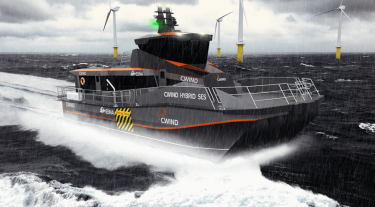Submissions were received from a range of single applicants and partnerships, representing a wide range of technologies and alternative fuel sources. The winners are: Chartwell Marine and Seaspeed Marine Consulting, CWind, Robert Allan Limited, and Windcat Workboats and CMB Technologies. Each of them will receive advice from the OWA partners to support the commercialisation of their technologies, in addition to a share of £300,000 in funding.
The selected technology concepts demonstrate the potential to reduce fuel consumption and emissions compared to conventional CTVs. They span a range of technology readiness levels: from desktop studies, through to prototype vessel construction.
The winning applications are:
Chartwell Marine and Seaspeed Marine Consulting:
A desktop study into the development of a 15 metre hybrid diesel/electric outboard CTV. The concept combines a high freeboard hull with two diesel and two electric outboard engines, which have not previously been used on CTVs. The design proposes to operate in up to 1.5 metre significant wave heights and transit speeds of 20 to 25 knots.
CWind Limited:
Supporting technology development for the construction of a prototype hybrid diesel/electric Surface Effect Ship (SES) CTV. The design combines a hybrid diesel/electric drivetrain with proven SES technology (provided by the Norwegian design house, ESNA). This 22 metre vessel will be able to carry 24 passengers at a transit speed of nearly 40 knots in significant wave heights in excess of 1.5 metres.
Robert Allan Limited:
A desktop study for a methanol/electric hybrid CTV. This concept takes advantage of the high volumetric energy density and stable liquid properties of methanol, in combination with a hybrid battery propulsion system. The study will look at the feasibility of applying this novel fuel type to a 21 metre CTV, capable of 20 knot transit speeds, in addition to boost and electric only operational modes.
Windcat Workboats and CMB Technologies:
Supporting the development of a prototype hydrogen powered CTV which utilises hydrogen-diesel co-combustion. The ‘Hydrocat 1’, based on the highly efficient Windcat MK3.5 platform, will be capable of using a majority of green hydrogen as fuel, delivering emission savings without compromising vessel performance.
The competition is being delivered by the Carbon Trust, with support from Black & Veatch, on behalf of the nine OWA industry partners: EnBW, Equinor, innogy, Ørsted, RWE Renewables, ScottishPower Renewables, Shell, SSE, and Vattenfall. The work is expected to conclude at the end of 2020.
Dan Kyle Spearman, Manager of Offshore Wind Access Systems, the Carbon Trust commented:
“We are pleased to announce the four winners from this competition, and to support the commercialisation of new and exciting technologies to reduce vessel emissions and fuel consumption. This competition demonstrates the commitment of the offshore wind industry to lowering the environmental impacts of its supply chain and we are looking forward to collaborating with the four winners to progress these innovative ideas.”
ENDS
For further information please contact the Carbon Trust press office on +44 (0) 20 7170 7050 or email press@carbontrust.com.
Notes to the Editor
Further information on the competition winners:
Chartwell Marine and Seaspeed Marine Consulting (UK)
Chartwell Marine is a pioneer in next-generation vessel design and Seaspeed Marine Consulting is an independent specialist in high-speed craft technology and advanced marine systems. The joint proposal from both businesses will see Chartwell leading the vessel design work, with Seaspeed carrying out R&D testing and hull form development.
CWind (UK)
CWind is part of the Global Marine Group, delivering crew transfer, maintenance and training services to the offshore renewables and utilities market. With experience at over 50 European offshore wind farms and a global team working across three continents, CWind is committed to delivering innovation and continuous improvement for customers in the offshore wind industry.
Robert Allan Limited (Canada)
Robert Allan Ltd. is a firm of internationally recognized naval architects in Vancouver, Canada. Since 1930, the company has built a reputation for innovative designs for vessels of all types, from high-performance tugs to sophisticated research vessels. The company also provides expertise in analyzing technical and financial aspects of marine operations and systems design.
Windcat Workboats and CMB Technologies (UK and the Netherlands)
Windcat Workboats is a leading provider of offshore wind crew transfer vessels; operating 45 CTVs of their own design. CMB Technologies is the Innovation and Development division of CMB NV. CMB Technologies focuses on hydrogen and low carbon technologies, energy saving solutions, digital fleet performance monitoring and weather routing.
The Offshore Wind Accelerator (OWA) is the Carbon Trust's flagship collaborative RD&D programme. The joint initiative was set up by the Carbon Trust and offshore wind developers in 2008. The current phase involves nine offshore wind developers who together account for 76% of Europe’s installed offshore wind capacity. The OWA programme aims to reduce the cost of offshore wind to be competitive with conventional energy generation, as well as provide insights regarding industry standard (and best practice) health and safety requirements. The OWA developer partners are: EnBW, Equinor, Innogy, Ørsted, RWE Renewables, Scottish Power Renewables, Shell, SSE and Vattenfall Wind Power.
About the Carbon Trust
The Carbon Trust is an independent, expert partner of leading organisations around the world, helping them contribute to and benefit from a more sustainable future.
- We advise businesses, governments and the public sector on their opportunities in a sustainable, low carbon world.
- We measure and certify the environmental footprint of organisations, supply chains and products.
- We develop and deploy low carbon technologies and solutions, from energy efficiency to renewable power.


